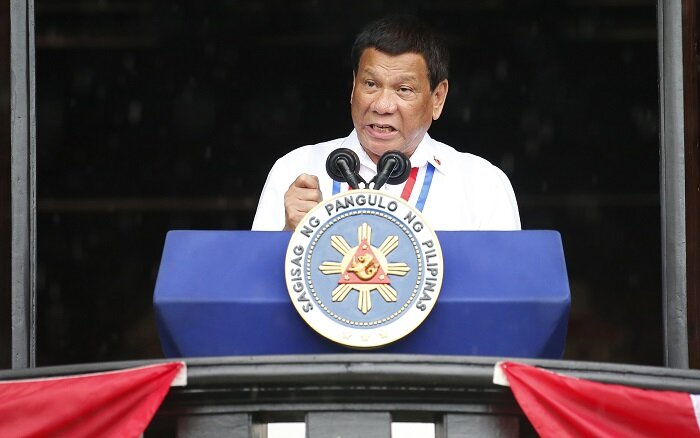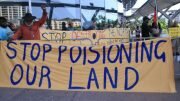When the Filipino news editor and journalist was announced as the winner of the Nobel Peace Prize, not everyone was delighted with her triumph.
In her home country, she is seen as one of the few last independent voices holding the increasingly authoritarian tendencies of President Rodrigo Duterte‘s government to account.
This has caused Duterte to use the full weight of the law to prosecute and persecute Ressa.
Peace Prize for safeguarding freedom of expression and transparency
The appeal of democracy has been waning worldwide over the past few years. The rise of populist and nationalist authoritarian figures, often propelled to power with the help of social media, has been evident throughout the world, from the shores of the Baltic to Brazil. One of the key bulwarks against the fading of democracy has been the work of journalists holding those in power to account. This was very much on the minds of the Norwegian Nobel Committee when they awarded the 2021 Peace Prize to two journalists whose voices are thorns in the side of authoritarian regimes.
The Norwegian Nobel Committee decided to award the 2021 Peace Prize to Maria Ressa and Dmitry Muratov. They won this honor “for their efforts to safeguard freedom of expression, which is a precondition for democracy and lasting peace…” This was viewed by many as a nod to the tireless work, worldwide, of members of the ‘Fourth Estate’ who often put their careers (and sometimes lives) on the line to bring truth and information out of the darkness and into the public view. For Ressa, this was the culmination of a career that has helped to nurture freedom of expression and government transparency at home in the Philippines.
A formative experience: The last years of the Marcos dictatorship
Since the 1986 overthrow of the kleptocrat President Ferdinand Marcos, the Philippines has experienced a surge in democracy. A campaign of a civil resistance in 1986 saw Marcos and his shoe-loving wife flee the country as democratic institutions were adopted under a new 1987 Constitution. This new Constitution ensured a restoration of freedom of expression and civilian rule over the military.
Born in Manila in 1963, Maria Ressa’s formative years were shaped by Marcos’ dictatorial rule throughout the 1970s and 1980s. Her father died when she was ten, and her mother and stepfather emigrated to the United States, where she was educated. Beginning her studies in microbiology at Princeton University, she graduated with a degree in English and was awarded a Fulbright Scholarship to study political theater at the University of Philippines Diliman. It was here that she first taught journalism, a subject that would dominate her life from then on.
International media work and the founding of Rappler
Upon returning to the Philippines, she saw a country which had thrown off an authoritarian regime and saw the flowering of democratic institutions. She co-founded an independent production company in 1987, Probe, and it was during the late 1980s that she first interviewed the then-Mayor of Davao, Rodrigo Duterte. Throughout the 1990s and 2000s she spent time as the Philippines Bureau Chief for CNN and headed the news division for ABC-CBN, a Filipino news organisation.
It was the 2012 formation of the news organization, Rappler, of which she is still the C.E.O, that would define her career. Rappler was unusual in that it had three female founders and assembled a small team of just 12 journalists.
A 2010 Manila hostage crisis, which saw eight Hong Kong tourists die, was the focus of an article in The Wall Street Journal. In it, she was critical of the crisis’ handling by the then President Benigno Aquino III. This was the first, but not the last, time she would be on a collision course with a President of the Philippines.
Holding Duterte to account with his bloody war on drugs
The election of President Rodrigo Duterte, in 2016, was the biggest threat to the still-fragile democracy of the Philippines. Running on a platform to clean up his country from the illegal drug trade, he has overseen extrajudicial killings of drug dealers, which has resulted in the deaths of thousands of Filipinos. Seen as tough on crime by his supporters, the Philippines has seen a creeping authoritarianism during his rule.
Rappler, and Ressa, have reported widely on the abuses of both the Police and Army, seen as being approved and sanctioned by Duterte, during this war on drugs. Furthermore, Rappler has reported on Duterte’s ‘troll army,’ which, with the help of social media, has twisted and warped his bloody and unlawful war on drugs as a righteous mission to clean up the Philippines.
Yet for Duterte and his supporters, Ressa, and Rappler, are seen as an annoyance at best and foreign agent at worst. In a 2017 State of the Union speech, Duterte labeled Rappler as being American-owned and propagating fake news. Since 2018, the government revoked Rappler’s business license due to being, in Duterte’s words, “fully owned” by Americans, which is both a violation of the Philippine constitution and business practices.

Ongoing legal battles
By reporting on and broadcasting to the world the abuses of the Duterte Government, Ressa has put herself, and Rappler, in the government’s crosshairs. Since the 2018 injunction to stop conducting business, Ressa has seen herself dragged again and again through the Filipino court system with a growing number of lawsuits meant to silence her criticism. Currently, Ressa is the focus of six lawsuits – three for alleged ownership irregularities, two for alleged tax evasion, and a single alleged defamation case.
In the murky world of Philippine politics, headed by authoritarian President Duterte, truth is in the eye of the beholder. His army of trolls has somewhat succeeded in an online smear campaign that has her being labeled as everything from a traitor to a foreign agent. The truth, however, is that the work she is doing through Rappler is one of the only truly independent media organizations left that doesn’t kowtow to the Duterte line. Her reporting of the abuses of the Duterte government, which has led to her legal persecution and problems, was a key reason to award her the joint winner of Time Magazine’s ‘Person of the Year’ in 2018. She was seen as one of a number of journalists putting either their lives or careers on the line to broadcast truth.
Nobel Peace Prize and the 2022 presidential election
The glitz and glamour of the Nobel Peace Prize ceremony are a world away from the often murky politics of the Philippines. It was only this week that a Filipino court granted Ressa the right to travel to Oslo to collect her award.
For all the progress that the Philippines have made since 1986, it appears that everything old is new again. As the Philippines have a strict one-term limit for Presidents, Duterte himself will be unable to run again in the upcoming Presidential elections on May 9, 2022. Yet Duterte’s daughter has announced her candidacy for Vice-President with her running partner for President, the son of the late dictator, Ferdinand Marcos Junior.
Many fear that it will be Duterte who is really pulling the strings of power if Marcos Junior and his daughter win the election next year. So if these two scions of authoritarian rulers take power in the Philippines next year, Maria Ressa’s struggle for government transparency, truth, justice, and the holding of those in charge to account is more important than ever. More mud, more lawsuits, and controversial comments, no doubt, will be thrown at Ressa but based on her career so far, this will not perturb her.
The opinions expressed are those of the author and are not held by Norway Today unless specifically stated.
About the author:
Jonathan is a lover of the written word. He believes the best way to combat this polarization of news and politics, in our time, is by having a balanced view. Both sides of the story are equally important. He also enjoys traveling and live music.
Source: #NorwayTodayTravel
Do you have a news tip for Norway Today? We want to hear it. Get in touch at [email protected]




This article by Jonathan looks like damage control.
Ressa is “controversial” indeed, and having her prize has stabbed fellow whistle-blower/journalist Julian Assange in the back, claiming WikiLeaks was reckless in its documents releases, although the U.S. Army has been unable to prove any allied deaths were caused by the leaks.
The Nobel Peace Committee turned its back on Assange, and on the very day of the peace awards ceremony yesterday, the British High Court overruled the judge who had refused to grant Assange’s extradition for his safety.
For further pertinent observations, see my comment under NT’s article at https://norwaytoday.info/culture/nobel-peace-prize-winners-hope-award-means-protection-from-danger/
The 2021 Nobel Peace Committee awards have already begun to stink.
Bottomline is that this is final proof the Nobel Peace Committee is just a Western propaganda front.
I was a senior in high school when President Kennedy was murdered … and obviously even then not just shot from behind by Lee Harvey Oswald … but the first time I ever really felt ashamed of being American was our so obviously criminally fraudulent invasion of Iraq in March 2003 (which was the first step to our other holocaust neocon Libya and Syria wars) and it has been steadily downhill since then.